Follow us on Telegram for the latest updates: https://t.me/mothershipsg
In line with its range of completely natural toothpastes, homegrown oral-care brand Pearlie White has developed a 100 per cent natural mouth rinse. But getting it to the market has been quite a challenge.
You see, a 100 per cent natural mouth rinse has nothing artificial added to it, not even artificial colouring.
"Consumers thought they were just using water! They said, 'Eh, nothing inside!'"
That's Andy Ong, the Managing Director of local distributor Corlison. He is also the founder of Corlison's flagship brand, Pearlie White.
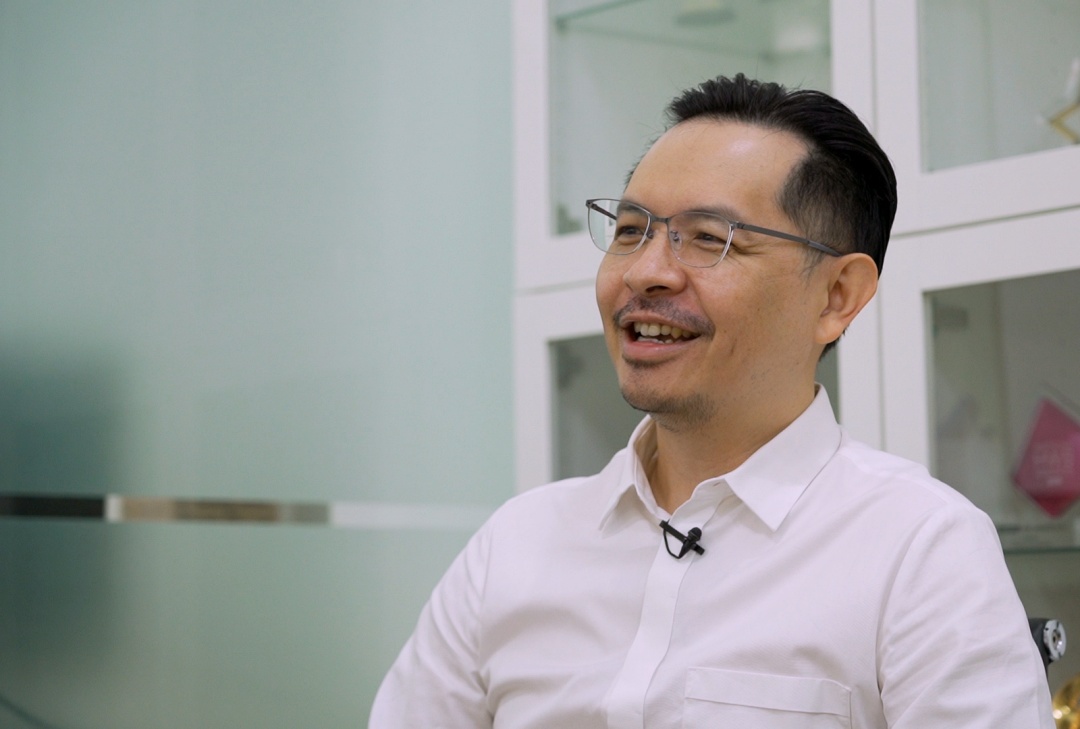 Mothership file photo.
Mothership file photo.
Launched in 2001, the brand boasts a wide range of oral-care products, from toothpastes to tablets for cleaning retainers. Rather fittingly, Ong himself is a descendent of the first certified practitioner of dentistry in Singapore, Cheong Chun Tin, who has a road named after him in Bukit Timah ("Can't get free parking even though it's my great-great-grandfather's road").
Having been a longtime user of Pearlie White's range of flouride mouth rinses, I can attest to the efficacy of the brand's products.
However, they tend to be overshadowed by offerings from international counterparts with bigger marketing budgets. Just think about those times you reached for a particular brand of toothpaste because nine out of 10 dentists recommended it or because it is the most-used brand by dentists worldwide.
But take a chance on Pearlie White the next time you're shopping for toothpaste and you'll find a brand that is unabashedly Singaporean.
In case the huge lion head emblem on its flagship product, The Real Red® Anti-Cavity Fluoride Toothpaste, isn't enough of a clue, Pearlie White wants you to know that it is the only homegrown oral-care brand that manufactures most of its products (toothpaste, mouth rinses, and breath sprays; basically anything that you might swallow) here in Singapore.
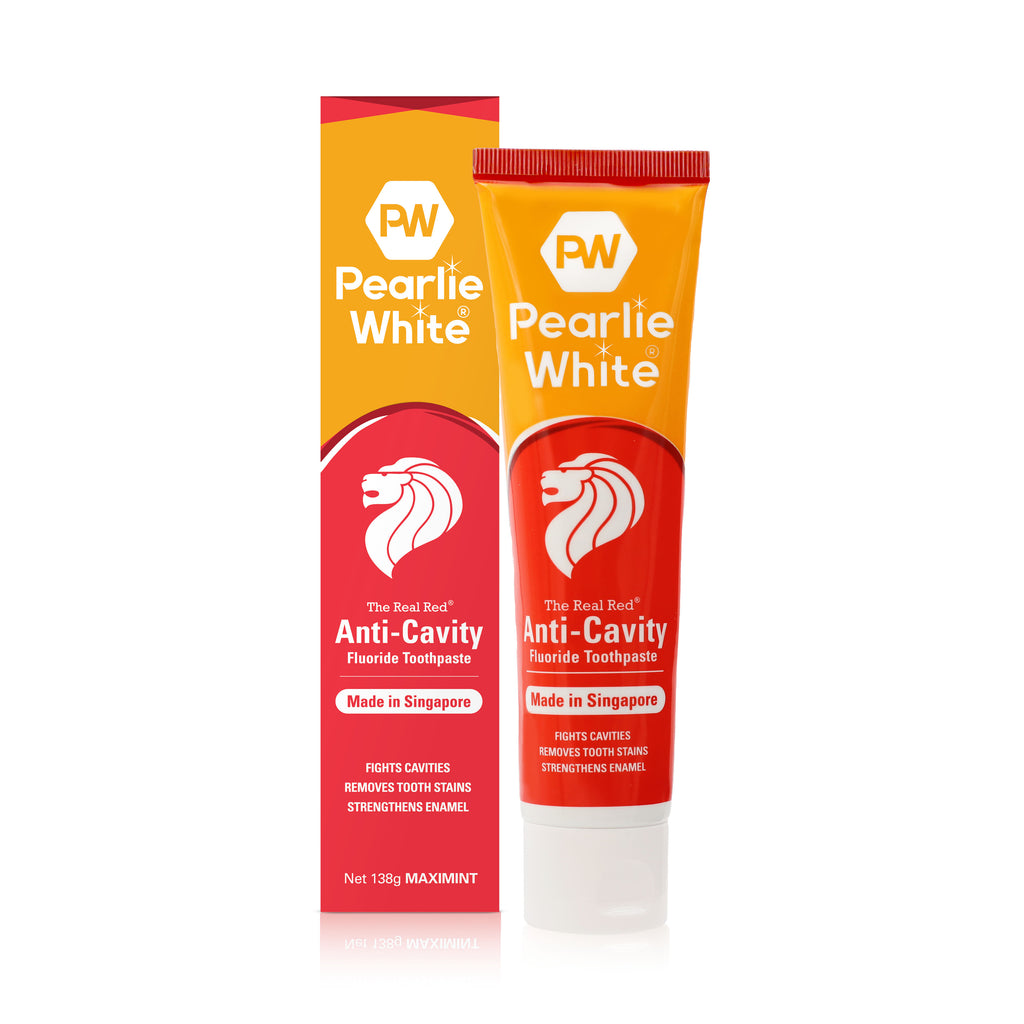 Unabashedly Singaporean. Image via Pearlie White.
Unabashedly Singaporean. Image via Pearlie White.
Ong calls it his way of "pushing the Singapore agenda", putting out a made-in-Singapore product into the hands (and mouths) of people around the world.
The "Made in Singapore" premium
There's another reason Pearlie White manufactures its toothpaste, mouth rinses, and breath sprays here: to capitalise on the Singapore brand that is synonymous with quality.
Perhaps here in Singapore, we tend to take it for granted that the mouth rinse we gargle — having gone through multiple health and safety tests — wouldn't poison us or rot our teeth. But the "Made in Singapore" stamp does make a difference, especially for discerning customers overseas, said Ong.
"Especially in Asia, when you have the 'Made in Singapore' label, that's something. They know the regulations are very strict and we have very high standards.
So I would say that if Pearlie White is not a Singaporean brand or if our products are not made in Singapore, it just won't be the same."
Of course, there is a cost to insisting on producing your products locally. Ong calls it the "Singapore Premium". Even with the best efforts in automation and productivity, Pearlie White's products are 25 per cent more expensive than its competitors.
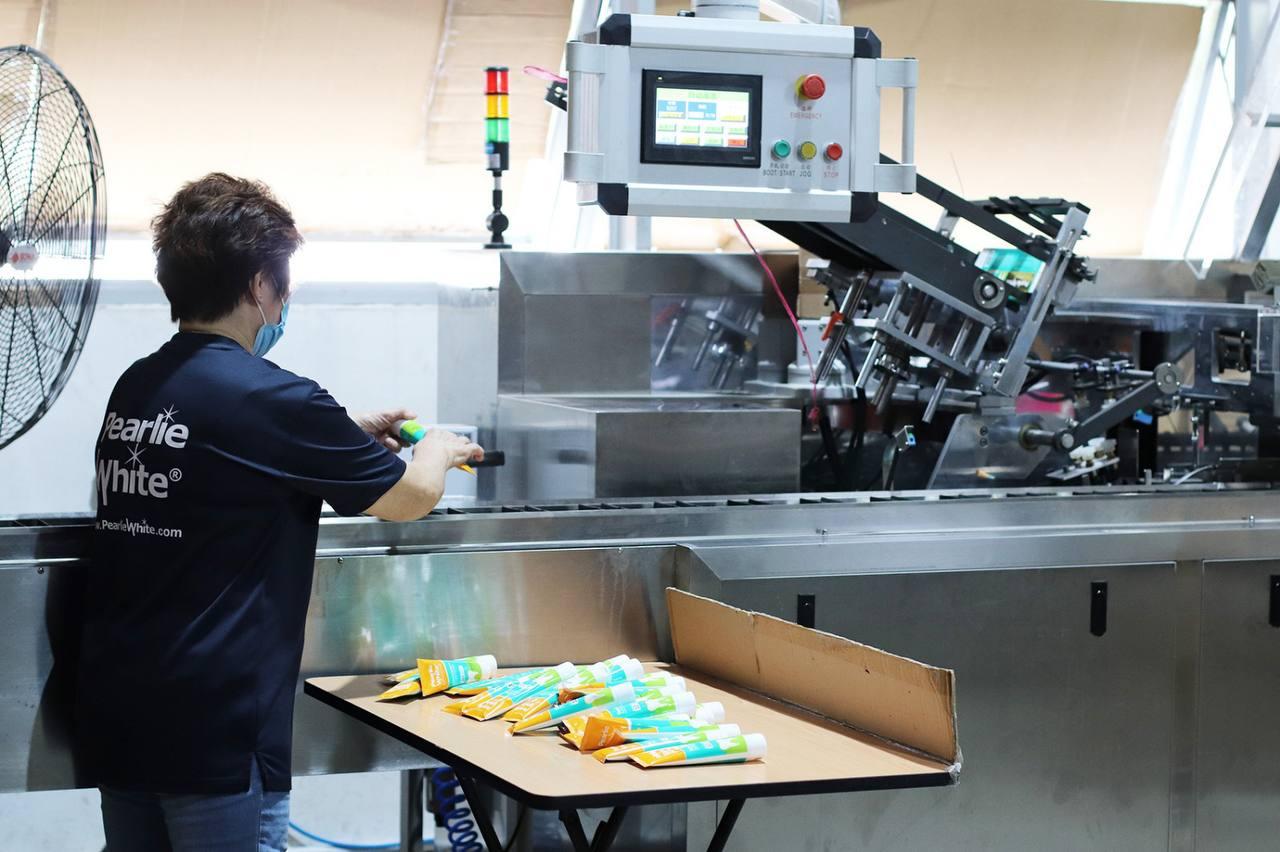 While Pearlie White invests in automation to manufacture, it also chooses to employ people to do stuff like packing. Image courtesy of Pearlie White.
While Pearlie White invests in automation to manufacture, it also chooses to employ people to do stuff like packing. Image courtesy of Pearlie White.
Strong growth overseas
That could explain why Pearlie White is not as well known locally as other international brands. But the brand is quickly making a name for itself overseas.
While most of its manufacturing is done here in Singapore, the bulk of Pearlie White's growth comes from overseas sales, driven by demand in Southeast Asia, the United States, and the Middle East.
Fun fact: Consumers in the United States are particularly enamoured with the brand's Active Remineralization Toothpaste which accounts for more than 90 per cent of Pearlie White's sales there.
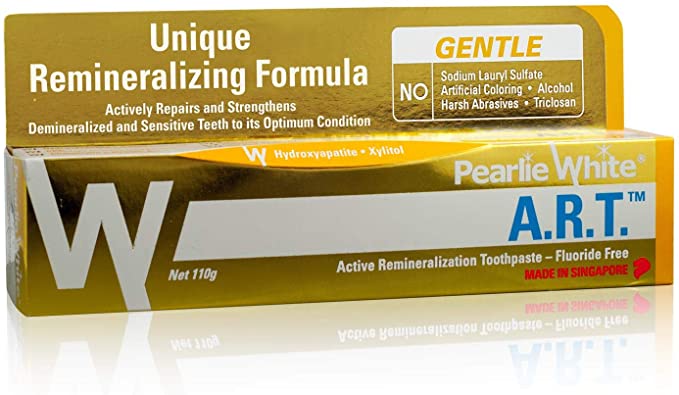
"The hype is real," said an impressed reviewer on Amazon. Another fawned over the "miraculous, immediate results" from using the toothpaste.
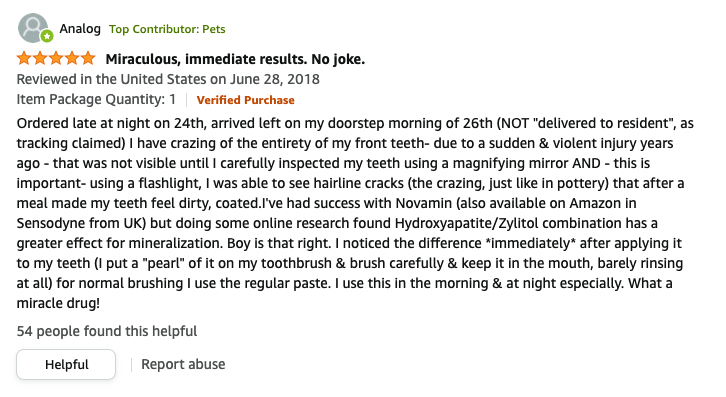
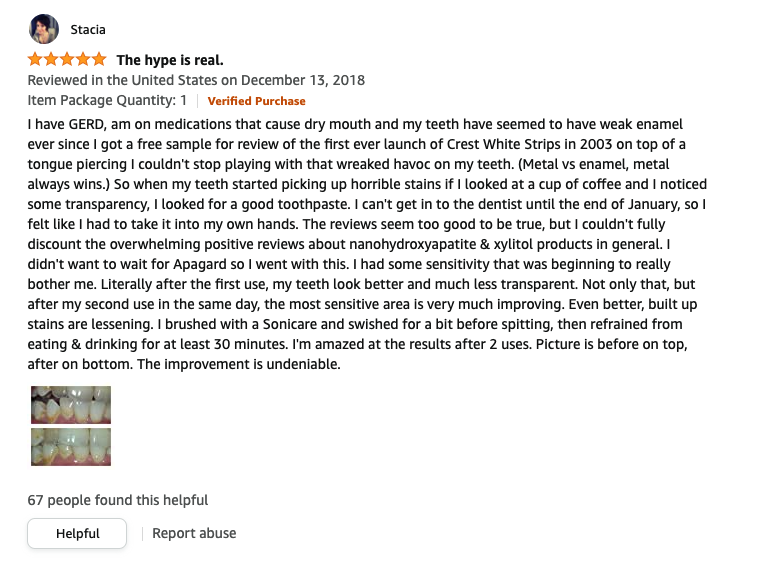
Ong foresees that within the next decade or so, the local market will make up only 10 to 15 per cent of the brand's sales.
For one, the overseas market is so much bigger than the Singapore market, with so much more potential for growth ("I always say if you have one per cent market share in China, it's 200 per cent of Singapore's market share.").
Aside from that, in a small market like Singapore's, it's hard to compete with international brands with deeper pockets to spend on advertising, rental, and space-buying.
"So unfortunately for us or any small brand or any young entrepreneur who wants to start a Singapore brand that is supposed to be sold at retail, it's very hard for you to get that attraction so that when consumers turn anywhere, they see your product."
Offering quality products that consumers want
However, there is a way for small brands like Pearlie White to compete with established international brands, and that is by offering consumers quality products.
To do that, Pearlie White invests about 25 per cent of its expenditure on research and development. And here's an even more interesting fact: the company refreshes the formulation of all its products every three years to cater to changing consumer needs and improvements in technology.
"There's always a better ingredient. There's always a better thing that we do that makes the efficacy of the product better. So we just continue improving...And remember for us, unfortunately, the one thing we cannot rely on is offering a product at a better price. We have to keep improving to justify to consumers why you have to pay a bit more."
The case of the Toothbrush Sterilising Tablet
But a good product is as good as useless if consumers don't see a need for it — a dear lesson that Ong and his team learned more than 10 years ago when they decided to develop a new product for the local market: the Toothbrush Sterilising Tablet.
It was a simple idea: Every two weeks or so, you dissolve a Toothbrush Sterilising Tablet in water and put in your toothbrush for it to be sterilised completely.
The product never caught on because, as Ong subsequently learned, with a toothbrush being cheaper than a cup of coffee, consumers would much rather replace it every two weeks instead of spending on a sterilising tablet. Perhaps in today's eco-conscious environment, consumers might embrace the Toothbrush Sterilising Tablet, but a decade ago, it was a "downright silly product", said Ong.
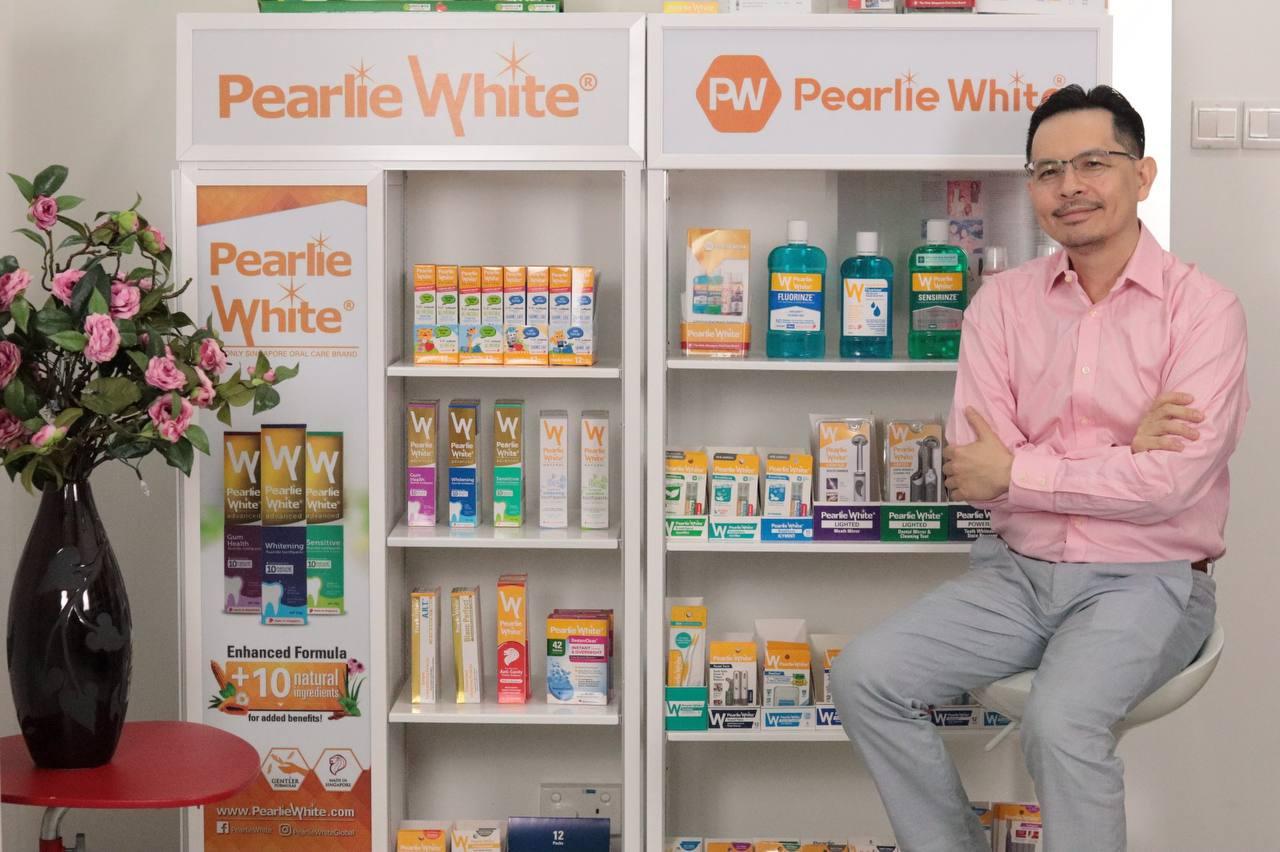 The formulations for all of Pearlie White's products are refreshed every three years. Image courtesy of Pearlie White.
The formulations for all of Pearlie White's products are refreshed every three years. Image courtesy of Pearlie White.
The art of listening
Today, Ong places a premium on product feedback.
"Something that a lot of people don't know, by the way, is when you send a feedback or complaint into either our Facebook, Instagram or even our email, right, I'm looking through every single one of it...And that also drives us to see how we can improve our products."
And it could be feedback about, literally, the smallest things.
If you were to take a look at a tube of Pearlie White toothpaste, you might notice that the hole is quite small. It is 25 to 30 per cent smaller than the competition, to be exact, and it gives users better control over how much product gets squeezed out.
That design is intentional. Pearlie White tweaked it after consumers told the company that a bigger tube hole leads to more product waste.
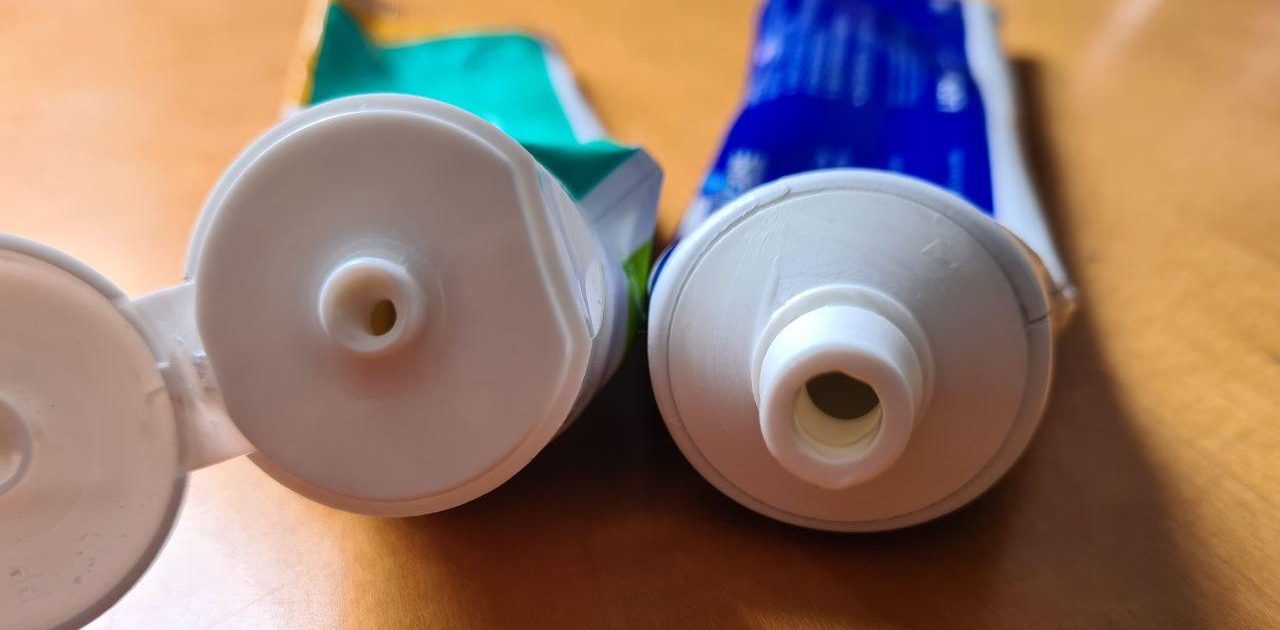 The holes in Pearlie Whites toothpaste tubes (left) are 25 to 30 per cent smaller than those from other brands. Image by Joshua Lee.
The holes in Pearlie Whites toothpaste tubes (left) are 25 to 30 per cent smaller than those from other brands. Image by Joshua Lee.
Pearlie White also maintains a working relationship with local dentists who provide invaluable feedback about new products that the company develops.
"The dentists are one of the key ways whereby we believe that we are still maintaining our share in the marketplace. They do like and promote our products because they know it's a Singapore brand and it's made in Singapore. So the support we get is pretty good."
In fact, it's thanks to feedback from dentists that Ong knows what the company shouldn't go for. For instance, Pearlie White will never produce a mouth rinse for kids. Why?
"Because that's the thing that dentists [don't want kids to use]. They want kids to brush their teeth. If you produce a mouth rinse for kids right, all kids will do is use the mouth rinse, don't want to brush their teeth. So you're actually teaching bad oral health practices...So there are certain things that we have certain standards and business ethics that we will not cross."
Ong understands that as a small company, the only way to survive is to have your finger on the pulse of what consumers and partners want. But sometimes, it presents a bit of challenge when people want contradictory things.
Going back to the 100 per cent natural mouth rinse:
"The irony is that we are trying to create things like natural mouth rinse which has no colour. We are working on that. Why haven't we launched? Because consumers just won't accept it and we don't want to repeat the mistake that we made in the past."
Challenging indeed, but it only spurs Ong and his team to work harder to put out a product that consumers will embrace.
"You know small companies cannot change consumer habits. We have to go along with what they want and try to create something better for them," he said.
Top image courtesy of Pearlie White.
Lessons on Leadership is a new Mothership series about the inspiring stories of Singapore’s business leaders and entrepreneurs, as well as the lessons and values we can learn from their lived experiences.
Follow and listen to our podcast here
If you like what you read, follow us on Facebook, Instagram, Twitter and Telegram to get the latest updates.
